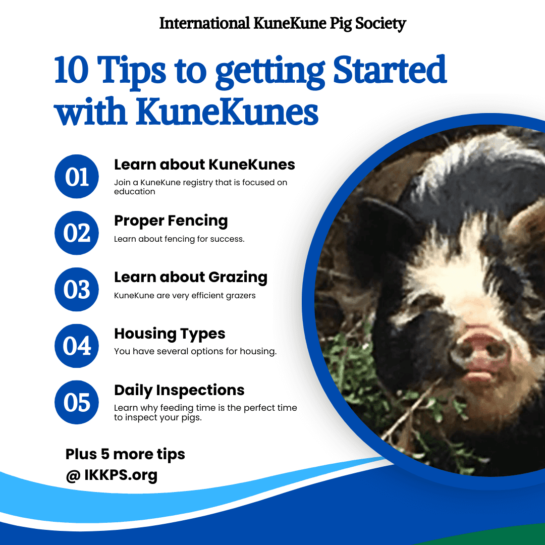
JOIN US
GET OUR KUNEKUNE
NEWSLETTER
New and highly discounted products, fresh and hot stories & useful information
10 Tips You Want to Know About Getting Started with KuneKune Pigs
If you're interested in starting your herd of KuneKune pigs, you've come to the right place! With these ten effective tips, you can embark on this new adventure with confidence.
What is a KuneKune pig?
But first, let's talk a bit about what a KuneKune pig is. Originally from New Zealand, these friendly and docile pigs are smaller and easier to handle than most other breeds. This makes them ideal for first-time pig farmers. Unlike other pigs, KuneKunes have very docile temperaments and are not prone to testing fences or destroying pastures. They can almost fatten on grazing alone, making them a cost-effective option for breeders and pork producers. Additionally, they serve many purposes, one of the most important being their delicious pork.

Tip 1 – Learn about KuneKune pigs and join a KuneKune Registry
Before embarking on a new journey, it is crucial to educate yourself and utilize the various learning opportunities available to you. Investing time in learning about the breed, researching breeders in your vicinity, studying breed standards, and being cautious in selecting your initial stock can be pivotal to your future success in the breed.
It is recommended that you select a registry that you believe has your best interests in mind. Evaluate their membership benefits and assess the learning opportunities and guidance they offer. Not all registries are created equal, so it is advisable to learn more about how they function and how accessible their support is.
Tip 2 - Proper Fencing
The best tip on this I was told when I first started in the breed was to put up the best fence that I could afford. It is possible to have 4-6 pigs on ½ acre. However, having 2-3 other areas of this size to do rotational grazing is a best practice. While KuneKunes are not prone to test fencing, you still want to provide safe fencing
to keep predators out like dogs. Utilizing field fencing is a cost-effective way to keep a KuneKune enclosed.
Some people will also use pallets for fencing. In most cases, you can get those free and if you paint them, they will last for years. Others use electricity in large areas so they can section it off and move their fencing around. I found this to be more of a pain. However, some KuneKune breeders prefer this method.
Moving pigs from pasture to pasture
You can move KuneKunes from one pasture to another as easily as shaking a box of Cheerios or grain in a bucket. They will follow you wherever you want to go and may try to beat you there. They are very food-motivated.
You want to ensure that you have enough area for your KuneKunes to move around and explore their environment. The ideal situation for a KuneKune is mostly pasture space that is maybe surrounded by some wooded areas. The wood areas will provide shade and other foraging opportunities.
Tip 3: High-quality foraging and Grazing
KuneKunes can fatten themselves on grazing alone, given that your pastures are well-planned and nutritious. KuneKunes love clover, so introducing it into moist areas can be very cost-efficient, as most clovers will come back or even grow naturally. Your pasture can consist of fescue, orchard grass, and even brome.
Having oak trees in your pasture area provides acorns, which is a KuneKune favorite. If you're tired of picking up fallen apples or pears, a KuneKune is more than happy to assist you with your chores.
KuneKune Waste
Since KuneKunes are clean animals and want to graze your pastures, they will tend to go to the bathroom along fence lines and in front of gates. Normally they will not go much to the pasture areas as they want to eat that grass. Making clean-up a breeze if you are composting.
Grain for KuneKunes
KuneKunes, a breed of pigs that are commonly used for breeding bacon seeds, require only two 8 oz cups of grain twice daily per pig. This amount is quite low when compared to what most dogs are fed. This makes them a cost-effective breed to raise. However, it is important to avoid overfeeding KuneKunes as they tend to act like they are starving all the time.
It is worth noting that KuneKunes have an internal clock, and if you feed them at the same time every day, they will learn to tell time. Although they are generally quiet, they can get noisy during feeding times. Therefore, it is crucial to choose high-quality feed that has a protein content of 16% or less, and also provide fresh water in multiple dishes on a daily basis.
Tip 4 - Housing
They adjust well to most temperatures with a minimum amount of effort. In the winter months, your KuneKune will need a draft-free area to get out of the weather. You can build an A-frame structure or even use a calf hut. Using a calf hut or Polydome has many advantages. It will house 3-4 grown KuneKunes easily even in a smaller size hut. You can hang freezer curtains like grocery stores use, outdoor rugs, or even carpet runners you can pick up at any Home Depot or Lowes very cheaply over the entrance as a flap. Done! That blocks out the weather.
An advantage to calf huts is the ability to push them over and roll them to another area very easily and quickly. It makes keeping their bedding fresh and clean so easy. KuneKunes are also exceptionally clean. They prefer not to soil their eating areas or bedding areas.
Summer months & mud puddles
Summer housing for KuneKune is as simple as a mud puddle and shade. Since pigs cannot sweat it is important to have a mud puddle. If you do not dig the mud puddle where you want it, the KuneKunes will assist you by consistently dumping their water dishes to soften the ground and they will root it out for you. My best advice is to dig the puddle yourself so you can choose the location of it.
Tip 5: Take advantage of Feeding Time
When you feed and water your pigs, it's a good idea to observe their interactions with each other to monitor their health daily. Take a moment to observe how they behave with each other, whether they are eating and drinking, how they are moving around, and their general behavior.
Pigs are good at hiding signs of illness, so establishing a daily routine during feeding or chore time can help you notice any unusual behavior that may indicate illness. Although KuneKunes are generally healthy and robust creatures, it's still important to check them daily. By doing so, you can detect any signs of illness early and take prompt action to treat them before they escalate into more serious problems.
Tip 6 - Experienced Vet
The time to find a knowledgeable vet is before you need them. Check with other local farmers to see who they use and ask for recommendations. Having a vet who makes farm calls is priceless in my opinion. If you have a trailer, you can also consider a vet that you take your pigs to as needed. However, in some cases what is wrong with them may make it difficult to load them in a trailer to go to the vet’s office.
Most routine care of your pigs can easily be learned and save you money such as vaccinations and deworming. Always check with your vet before starting a vaccination protocol as this can vary depending on where you live.
KuneKunes are a heritage breed and like most heritage breeds in general, tend to be hardy and healthy.
Tip 7: Purchasing your Starter Herd.
It is essential to find a breeder who is experienced and knowledgeable in the breed you're interested in. Such a person can serve as your mentor and provide support whenever you need it. You can ask them questions to gauge their level of experience or expertise. However, it doesn't mean that a new breeder cannot support you. This depends on their research and level of knowledge, as well as the guidance they received when starting. Additionally, it may be worth considering where they acquired their stock and who their mentor is.
Tip 8: Starter Herd
The ideal starter herd will consist of 2 females, 1 boar, and 1 barrow. The reason this is ideal is like most pigs, KuneKunes is a herd animal that does not do well by themselves. Therefore, having a companion is important. All four pigs can stay together until the males reach 6 months of age. Then you will have to separate the males from the females.
The barrow (neutered male) serves as a companion to the boar and of course, the two females keep each other company as well. KuneKunes are usually ready to breed around 12-16 months for females. The bloodlines do have some bearing on the age they can be bred. When it is time to breed your KuneKune the barrow goes with the female (gilt) that you are not breeding as a companion. The gilt you want to breed should be moved into the boar area. They will serve as companions while they are breeding.
Tip 9: Barrows
Another advantage of the barrow that most do not consider is you are starting your pork production. So, the barrow is not only able to serve as a companion to any one of the KuneKunes but, they are growing and maturing to be harvested for their pork.
In managing my herd, I would keep unwattled male piglets or piglets that did not meet the breed standard for selling as breeding stock, easily neuter them and when ready to harvest a boar’s companion, I would put a piglet around 5-6 months in with the boar and start those pork machines growing.
Tip 10: KuneKune Pork
Now a quick note on the KuneKune pork, Kunekune pork is a rich red marbled meat. It is locked in a layer of fat which locks in the flavor. While they do not reach harvest age till 9-12 months depending on your herd management style and the bloodlines that you choose, they cost less to get to that age than other breeds of swine. You are not dumping massive amounts of feed into them since they are grazing pigs.
KuneKune meat is rich in vitamin B and omega 3 and 6. Since most of their nutrition comes from grazing their meat is much healthier as compared to what pork products you purchase in the grocery store.
KuneKune Meat Pricing
Another wonderful advantage is that pork prices for KuneKune meat are much higher. So, while they are smaller, the return with meat pricing will make up for their smaller size.
Summary
In conclusion, you have learned much about homesteading with KuneKunes and how they make a fantastic addition to anyone wanting a smaller, docile, friendly, and easy-going pig to deal with daily while providing pork for their family that they can be proud of. Humanely, raised pork is a skill that farms across America are perfecting to become more sustainable.
To learn even more about KuneKunes please visit our website. We are a purebred KuneKune Registry that supports our members in all their Kunekune endeavors and
provides free registration services with 2 different membership levels and continued learning opportunities monthly. We also mentor all our KuneKune Breeders,
and we believe in individualized touch. You can reach out to us by phone, text, Facebook Messenger, and email. We will even help you in choosing your stock all
free.
Registry Office
17500 Hamilton Arms Court Dewitt, VA 23840